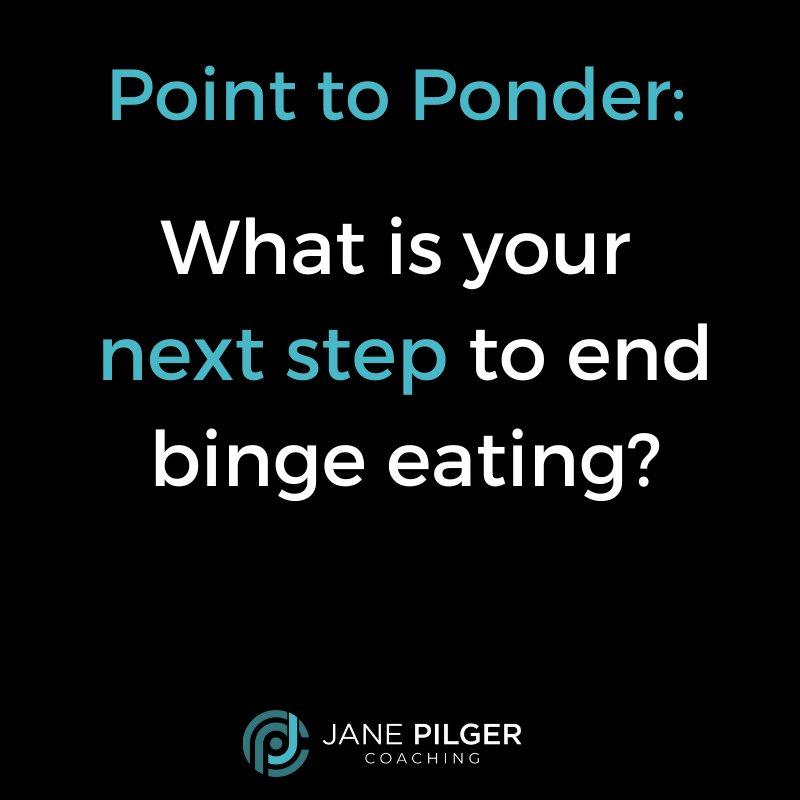October has been a month of celebration at The Peaceful Eater! I've been marking the 100th episode of the Binge Breakthrough podcast with "top 10" insights each week. As we wrap up this special month, let's focus on action - specifically, 10 concrete steps you can take to move forward on your journey to end binge eating.
Remember, you don't need to implement all of these at once. Choose one that resonates with you and start there. Small steps lead to significant changes over time.
1. Get Support
The journey to end binge eating isn't meant to be walked alone. While it's possible to make progress on your own, having support can accelerate your healing and make the journey feel less isolating.
If you don’t have someone in your life that you can talk to about your struggles, there are several ways you can get support right now:
- Join my Binge Free Holiday Workshop to learn new strategies and simple tools that will change your experience of food and the holidays this year. (It’s free!)
- Consider my special holiday coaching package - navigate the challenging holiday season with personalized support and guidance. (Spots are filling fast - get yours today.)
- Become a paid subscriber to The Peaceful Eater for opportunities to connect with others who truly understand the struggle.
2. Check In With Yourself Regularly
One of the most powerful tools you can develop is a regular check-in practice using what I call the 3 Powerful Questions:
- What do I notice? (Build awareness without judgment)
- What do I need? (Connect with your true needs)
- What's next? (Take aligned action)
These questions help you stay connected with yourself and catch potential triggers before they escalate. Put a reminder in your phone, or put them on a sticky note in a place where you will see them often.
3. Build a Consistent Eating Rhythm That Works for Your Life
Notice I didn't say "stick to a strict meal plan" or "follow these rules." The key is finding a rhythm that:
Nourishes your body regularly
Fits your schedule
Feels sustainable for YOUR life
Prevents extreme hunger
Remember, restriction is a primary trigger for binge eating. Your rhythm should support you, not restrict you. If your eating is inconsistent (large amounts one day and small amounts the next), your body won’t know what’s coming and when.
4. Practice Pausing Between Trigger and Response
As Viktor Frankl wisely noted, our power lies in the space between stimulus and response. The pause isn't about using willpower - it's about creating space to:
Notice what's happening (What do I notice?)
Connect with what you really need (What do I need?)
Choose your next step intentionally (What’s next?)
Even a brief pause can break the automatic cycle of triggering and binging.
5. Start a Curiosity Journal to Track Patterns
Instead of logging food or counting calories, try tracking:
Patterns you notice around challenging times with food
What was happening before, during, and after
How you were feeling
What helped or didn't help
Approach this with curiosity rather than judgment. You're gathering information, not collecting evidence against yourself.
6. Learn to Distinguish Between Physical and Emotional Hunger
This isn't about labeling one type of hunger as "good" and another as "bad." Instead, it's about understanding:
Different types of hunger signals
What your body is communicating
What you might really need in the moment
This awareness helps you respond more effectively to both physical and emotional needs.
7. Practice Feeling Emotions in Small Doses
Many of us turn to food because we haven't learned how to sit with uncomfortable emotions. Start small:
Notice when emotions arise
Name the emotion
Stay with it for just 30 seconds, narrating your experience (“I feel heaviness in my chest, or buzzing in my arms…)
Gradually build your capacity to experience emotions without immediately reacting
8. Develop a Compassionate Inner Dialogue
The way you talk to yourself matters. Practice:
Noticing negative self-talk
Challenging shame-based thoughts
Speaking to yourself as you would a friend
Remembering that setbacks are part of the journey, not evidence of failure
9. Create Clear Boundaries Around Work and Rest
Overwhelm and fatigue are common triggers for binge eating. Consider:
Setting work/life boundaries
Creating transition rituals
Prioritizing rest and recovery
Understanding that rest is productive
10. Create a List of Non-Food Ways to Celebrate and Cope
Food can become our default way to both celebrate and cope. There is nothing wrong with celebrating and coping with food when it is one of many options. Expand your options by:
Listing activities that bring you joy
Identifying ways to self-soothe that don't involve food
Creating new rituals for celebration
Building a toolkit of coping strategies
Next Steps
Looking at these 10 actions, which one resonates most with you right now? That's your next step. Remember, you don't need to do everything at once. Choose one small step and start there.
Ready for more support on your journey? I've got two special opportunities for you:
Join the free Binge Free Holiday Workshop - Learn the fundamental shifts needed to break free from the binge cycle and truly enjoy the holidays this year.
Special Holiday Season Coaching Package - Navigate the holidays with confidence and support. Limited spots available. Get yours today!
Don't forget about our 100th episode celebration giveaway! Submit your question or podcast review for a chance to win one of two $100 gift cards. Deadline is 10/31/24.
Remember, your journey to peace with food is possible. Each step forward, no matter how small, is progress to be celebrated. I'm here to support you along the way.
Subscribe to the Peaceful Eater for weekly insights, support and resources for your journey with food.





Putting my RAS to work on journaling and exploring my transition rituals and curiosity around food patterns! Before, during and after!